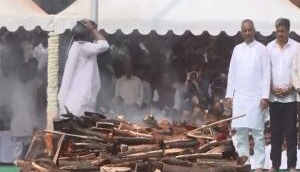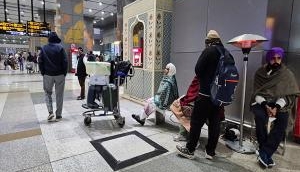
Restrictions that were imposed in view of Friday prayers were lifted from all parts of the city on Saturday, but normal life remained affected for 90th day in Kashmir following the abrogation of provisions of Article 370.
"There are no restrictions on movement of people in any part of the valley today. Normal activities are being witnessed across Kashmir," a police official said. While Friday prayers were not allowed in the historic Jamia Masjid in Nowhatta area for 13th week, Khoj-e-Digar -- the special evening prayer held at Naqashband Sahib shrine here -- was not allowed on Friday.
It was for the first time that Khoj-e-Digar, which is a centuries-old tradition specific to Kashmiri Muslims, was not been offered.
The official, however, said the deployment of security forces continues in vulnerable areas of the city and elsewhere in the valley for maintaining law and order. The situation across the valley so far is peaceful, the official said. Although there was increased movement of private vehicles and cabs on the city roads, normal life remained disrupted in the valley for the 90th day following abrogation of the special status of Jammu and Kashmir and its bifurcation into union territories.
Markets closed around noon, the self-imposed deadline of operations in Kashmir, while educational activities, except for the board examinations remained suspended, the official said. The efforts of the state government to open schools over the past three months have not borne any fruit as parents have kept children at home due to apprehensions about their safety.
While landline and postpaid mobile phone services have been restored across the valley, all Internet services continue to remain suspended since the night of 4 August -- hours before the Centre announced its decision to abrogate provisions of Article 370.
Most of the top level and second-rung separatist politicians have been taken into preventive custody while mainstream leaders including former chief ministers Omar Abdullah and Mehbooba Mufti have been either detained or placed under house arrest. The government has detained former chief minister and sitting Lok Sabha MP from Srinagar Farooq Abdullah under the controversial Public Safety act, a law enacted by his father and National Conference founder Sheikh Mohammad Abdullah in 1978 when he was the chief minister.
-PTI
Also Read:







![BJP's Kapil Mishra recreates Shankar Mahadevan’s ‘Breathless’ song to highlight Delhi pollution [WATCH] BJP's Kapil Mishra recreates Shankar Mahadevan’s ‘Breathless’ song to highlight Delhi pollution [WATCH]](https://images.catchnews.com/upload/2022/11/03/kapil-mishra_240884_300x172.png)

![Anupam Kher shares pictures of his toned body on 67th birthday [MUST SEE] Anupam Kher shares pictures of his toned body on 67th birthday [MUST SEE]](https://images.catchnews.com/upload/2022/03/07/Anupam_kher_231145_300x172.jpg)






